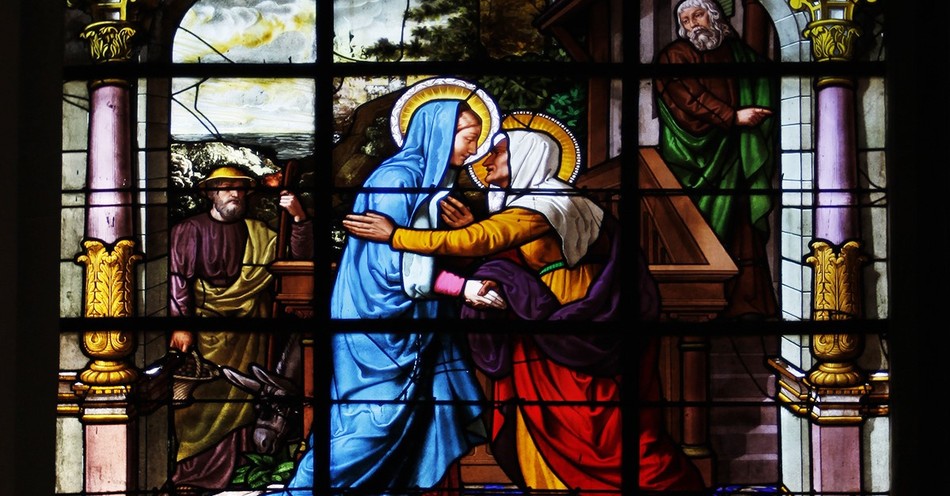An often-overlooked detail in the Gospel of Luke reveals the powerful value God places on pre-born life.
One overlooked grace from God is that He, in His infinite wisdom, gave us four Gospels, instead of just one or two. For example, if it were up to only Matthew and Mark, we’d have the impression that John the Baptizer appeared out of nowhere and was more than a little weird. After all, it is from their accounts of John that we learn of his odd wardrobe and even odder diet.
A point about John that every one of the Gospels emphasizes is that he was a fulfillment of a promise from the prophets Malachi and Isaiah: “Behold, I send my messenger, and he will prepare the way before me” (Malachi 3:1).
A voice cries: “In the wilderness prepare the way of the Lord; make straight in the desert a highway for our God.” (Isaiah 40:3)
Neither Matthew, whose Gospel begins with a nativity story, nor Mark, whose Gospel does not contain an account of Jesus’ birth, include any details that connect John to the beginning of Jesus’ story. Luke and John, however, do make that connection.
Luke’s Gospel contains the most details about John’s beginning, specifically that, like Jesus, John’s birth was miraculous and also involved a visitation from the angel Gabriel. But it is one particular detail, one often overlooked detail, that is especially remarkable and instructive for our cultural moment. Luke reveals that John the Baptist was the first person—other than Mary, who was told by the angel—to recognize Jesus as the Messiah.
While Mary was still pregnant with Jesus, she went to visit John’s mother Elizabeth, who was also still pregnant. Luke describes what happened, likely telling the story as he had heard it from Mary herself:
And when Elizabeth heard the greeting of Mary, the baby leaped in her womb. And Elizabeth was filled with the Holy Spirit, and she exclaimed with a loud cry, “Blessed are you among women, and blessed is the fruit of your womb! And why is this granted to me that the mother of my Lord should come to me? For behold, when the sound of your greeting came to my ears, the baby in my womb leaped for joy.”
So, Elizabeth then becomes the third person to recognize Jesus as the Messiah, and she seems to imply that her own preborn child had informed her about the identity of Mary’s preborn child. This account, described in only six verses, speaks volumes about how God thinks of life in the womb, when life begins, when our unique identity as human beings begins, the value of preborn human life, and even how God’s purpose for our lives means something from the start.
In fact, the angel Gabriel had already informed Zechariah, John’s father, about who his son would be:
[Y]our wife Elizabeth will bear you a son, and you shall call his name John. And you will have joy and gladness, and many will rejoice at his birth, for he will be great before the Lord. And he must not drink wine or strong drink, and he will be filled with the Holy Spirit, even from his mother’s womb. And he will turn many of the children of Israel to the Lord their God, and he will go before him in the spirit and power of Elijah, to turn the hearts of the fathers to the children, and the disobedient to the wisdom of the just, to make ready for the Lord a people prepared.
In this interaction between Mary, Elizabeth, and their preborn children, John is already fulfilling the purposes God has for him, in utero. While still in her womb, John helped his own mother prepare for the coming of the Lord. She then encouraged Mary in her preparation for the coming of the Lord, the One she was carrying at that time.
After Elizabeth’s encouragement, Mary breaks out into song, the Magnificat, uttering words that have not only instructed and encouraged millions of people throughout Christian history as they prepare for the Lord, but which also definitively answer the question immortalized in another song, “Mary, Did You Know?” Apparently, she knew, and she composed a whole song about it.
As we head to the end of 2023, would you keep Breakpoint and the Colson Center in mind as you plan your year-end giving? These daily commentaries reach and equip hundreds of thousands of people each week, carrying on the vision that God gave Chuck Colson 35 years ago. If Breakpoint has helped you think clearly in 2023 about this cultural moment, you can support the work at colsoncenter.org/give.
For more resources to live like a Christian in this cultural moment, go to breakpoint.org.
This article originally appeared on BreakPoint.org, used with permission.
Publication date: December 22, 2023.
Photo credit: ©Getty Images/ digitalimagination
John Stonestreet is President of the Colson Center for Christian Worldview, and radio host of BreakPoint, a daily national radio program providing thought-provoking commentaries on current events and life issues from a biblical worldview. John holds degrees from Trinity Evangelical Divinity School (IL) and Bryan College (TN), and is the co-author of Making Sense of Your World: A Biblical Worldview.
The views expressed in this commentary do not necessarily reflect those of CrosswalkHeadlines.
BreakPoint is a program of the Colson Center for Christian Worldview. BreakPoint commentaries offer incisive content people can't find anywhere else; content that cuts through the fog of relativism and the news cycle with truth and compassion. Founded by Chuck Colson (1931 – 2012) in 1991 as a daily radio broadcast, BreakPoint provides a Christian perspective on today's news and trends. Today, you can get it in written and a variety of audio formats: on the web, the radio, or your favorite podcast app on the go.




